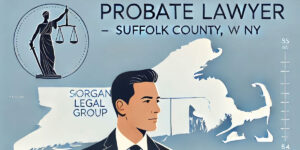Long Island Will Attorney: Planning Your Legacy for 2025
Securing your family’s future and ensuring your wishes are honored starts with a well-crafted will. As we move closer to 2025, the importance of having a legally sound will prepared by a qualified attorney becomes even more apparent for Long Island residents. As a dedicated New York estate planning attorney at Morgan Legal Group, I understand the unique challenges and opportunities facing Long Island families when it comes to estate planning. This comprehensive guide will provide you with essential information about wills, why you need a skilled will attorney on Long Island, and how we can help you create a plan that protects your loved ones and preserves your legacy.
Many Long Islanders understand the importance of having a will, but may not realize the complexities involved in drafting a document that accurately reflects their wishes and complies with New York law. Engaging a qualified attorney ensures that your will is legally valid, minimizes the risk of disputes, and provides peace of mind knowing your assets will be distributed according to your plan. Let’s delve into the critical aspects of will preparation and how a Long Island will attorney can be an invaluable asset.
What is a Will and Why is it Important?
A will, also known as a “last will and testament,” is a legal document that outlines your wishes regarding the distribution of your assets after your death. It names beneficiaries who will inherit your property, designates an executor to manage your estate, and can even provide for the care of minor children. Without a will, your assets will be distributed according to New York State’s intestacy laws, which may not align with your intentions. Therefore, a will becomes an essential component of any estate plan.
A well-drafted will provides clarity and control over your estate, ensuring that your loved ones are provided for and your wishes are respected. It can also help minimize potential family disputes and simplify the probate process. Because of this, having a will ensures your intentions are known after death.
The Consequences of Dying Without a Will (Intestacy)
When a Long Island resident dies without a will, they are considered to have died “intestate.” In this scenario, New York State law dictates how their assets will be distributed. The distribution depends on the family structure. For example, if there’s a surviving spouse and children, the spouse may only inherit a portion of the estate, with the children receiving the rest. This may not be the desired outcome, especially if you want to provide primarily for your spouse.
Intestacy can also create unnecessary complications and delays in the probate process, as the court must appoint an administrator to manage the estate. This administrator may not be someone you would have chosen, and their decisions may not reflect your wishes. Therefore, avoiding intestacy is a significant advantage of creating a will.
Key Elements of a Valid Will in New York
To be legally valid in New York, a will must meet certain requirements. Understanding these requirements is crucial to ensuring that your will is enforceable. The essential elements include:
- Testamentary Capacity: The person making the will (the “testator”) must be of sound mind and have the legal capacity to understand what they are doing.
- Written Document: The will must be in writing. Oral wills are not valid in New York, except in very limited circumstances.
- Signature: The testator must sign the will, or direct someone to sign it on their behalf in their presence.
- Witnesses: The will must be signed in the presence of two witnesses, who must also sign the will as witnesses.
Failure to comply with these requirements can render the will invalid, leading to intestacy and the unintended distribution of your assets. Because of this, it is so important to comply with all legal guidelines.
The Importance of Proper Execution
Even if a will appears to be well-drafted, improper execution can invalidate it. This is why the witnessing requirements are so critical. The testator and witnesses must follow the correct procedures when signing the will. This includes being in each other’s presence and understanding the nature of the document. A will attorney ensures that the execution process is handled correctly, safeguarding the will’s validity and preventing future challenges.
Why You Need a Will Attorney on Long Island
While it may be tempting to use online templates or attempt to draft a will yourself, engaging a qualified will attorney on Long Island offers significant advantages. A skilled attorney can provide:
- Expert Legal Advice: An attorney understands the complexities of New York estate law and can provide tailored advice based on your unique circumstances.
- Customized Will Drafting: An attorney can draft a will that accurately reflects your wishes and addresses your specific needs, such as providing for minor children, creating trusts, or minimizing estate taxes.
- Proper Execution: An attorney ensures that your will is properly executed, minimizing the risk of challenges or disputes.
- Peace of Mind: Knowing that your will is legally sound and reflects your intentions provides invaluable peace of mind for you and your family.
Moreover, a will attorney can help you navigate the complexities of estate planning and make informed decisions that protect your loved ones and preserve your legacy.
Addressing Complex Family Situations
Many Long Island families have complex dynamics, such as blended families, stepchildren, or estranged relatives. A will attorney can help you navigate these situations and draft a will that addresses your specific concerns. They can provide strategies for ensuring that your loved ones are provided for while minimizing the potential for disputes. This personalized approach is invaluable in complex cases.
The Role of a Will Attorney in Estate Planning
A will is often the cornerstone of a comprehensive estate plan. However, it is just one piece of the puzzle. A skilled will attorney can help you develop a holistic estate plan that addresses all of your needs and goals. This may include:
- Will Preparation: Drafting a legally sound will that accurately reflects your wishes.
- Trust Creation: Establishing trusts to manage assets, provide for loved ones with special needs, or minimize estate taxes.
- Power of Attorney: Designating someone to manage your financial affairs if you become incapacitated.
- Health Care Proxy: Appointing someone to make medical decisions on your behalf if you are unable to do so.
- Living Will: Outlining your wishes regarding medical treatment in the event of a terminal illness or incapacity.
By working with a will attorney, you can create a comprehensive estate plan that provides for your loved ones, protects your assets, and ensures your wishes are honored.
Benefits of a Comprehensive Estate Plan
A comprehensive estate plan offers numerous benefits beyond simply distributing your assets after death. It can provide for your care during your lifetime, protect your assets from creditors, and minimize estate taxes. It also provides clear guidance for your loved ones, reducing stress and potential conflict during a difficult time. The peace of mind that comes with knowing you have a well-designed plan is invaluable.
Common Types of Wills in New York
There are several types of wills available in New York, each suited to different situations and needs. A will attorney can help you determine which type of will is best for you:
- Simple Will: A straightforward will that distributes assets to beneficiaries without complex provisions.
- Testamentary Trust Will: A will that creates a trust upon your death to manage assets for beneficiaries, often used for minor children or individuals with special needs.
- Pour-Over Will: A will that “pours” assets into a previously established trust, ensuring all assets are managed according to the trust’s terms.
- Joint Will: A single will for two people, typically a married couple, outlining how their assets will be distributed after both have passed away (less common and often discouraged).
Understanding the different types of wills allows you to make informed decisions about your estate plan and choose the option that best suits your needs.
Choosing the Right Type of Will
The type of will you choose depends on your individual circumstances, the complexity of your assets, and your goals for your estate plan. A simple will may be sufficient for those with straightforward estates, while a testamentary trust will may be necessary to provide for minor children or manage assets for beneficiaries over time. A will attorney can assess your situation and recommend the most appropriate type of will for you.
Avoiding Common Will-Drafting Mistakes
Drafting a will can be complex, and there are several common mistakes that can invalidate your will or lead to unintended consequences. A will attorney can help you avoid these pitfalls:
- Ambiguous Language: Using vague or unclear language that can lead to interpretation disputes.
- Failing to Update: Not updating your will after significant life events, such as marriage, divorce, or the birth of a child.
- Improper Beneficiary Designations: Failing to properly designate beneficiaries for retirement accounts or life insurance policies, which can override the provisions of your will.
- Ignoring Tax Implications: Not considering the tax implications of your will, which can lead to unnecessary estate taxes.
By working with a will attorney, you can ensure that your will is clear, up-to-date, and addresses all potential issues.
The Importance of Regular Will Reviews
Life circumstances change, and your will should reflect those changes. Regularly reviewing your will with an attorney ensures that it remains consistent with your wishes and addresses any new developments in your life. This includes updating beneficiary designations, adjusting asset distribution plans, and accounting for changes in tax laws. Regular reviews keep your estate plan current and effective.
The Probate Process in Long Island: What to Expect
After your death, your will must go through the probate process, which is the legal procedure for validating the will and distributing your assets. A will attorney can guide your executor through this process, which involves:
- Filing the Will: Filing the will with the Surrogate’s Court in the county where you resided.
- Notifying Beneficiaries: Notifying all beneficiaries and heirs of the probate proceeding.
- Inventorying Assets: Preparing an inventory of all your assets.
- Paying Debts and Taxes: Paying any outstanding debts and taxes.
- Distributing Assets: Distributing the remaining assets to the beneficiaries according to the terms of your will.
The probate process can be complex and time-consuming. However, a will attorney can help streamline the process and minimize potential delays or disputes.
Minimizing Probate Challenges with a Well-Drafted Will
A clear and well-drafted will can significantly reduce the potential for challenges during probate. By anticipating potential issues and addressing them proactively in your will, you can minimize the risk of disputes among beneficiaries. A will attorney’s expertise in drafting and executing wills ensures that your document is less vulnerable to legal challenges, streamlining the probate process for your loved ones.
The Cost of a Will Attorney on Long Island
The cost of hiring a will attorney on Long Island can vary depending on the complexity of your estate and the services you require. However, the investment in a qualified attorney is well worth it, considering the potential costs of intestacy or a poorly drafted will. Many attorneys offer various fee arrangements, such as:
- Flat Fee: A fixed fee for drafting a simple will.
- Hourly Rate: An hourly rate for more complex estate planning services.
- Contingency Fee: A percentage of the assets recovered in a will contest or other dispute (less common).
It is important to discuss fees upfront with your attorney and understand the scope of services included. This way, you will get what you need at the best possible price.
The Value of Expert Legal Counsel
While the upfront cost of hiring a will attorney may seem significant, the long-term value of expert legal counsel is immeasurable. A well-drafted will can save your family time, money, and emotional distress by avoiding probate complications and minimizing potential disputes. The investment in a qualified attorney protects your assets and ensures your wishes are honored, making it a wise decision for your family’s future.
Why Choose Morgan Legal Group for Your Will Preparation Needs on Long Island?
Selecting the right attorney to help you with will preparation is essential. At Morgan Legal Group, we have a deep understanding of New York estate law. We are committed to providing our clients with personalized and effective legal solutions. Here’s why you should choose us:
- Experience: We have years of experience assisting Long Island families with will preparation and estate planning.
- Expertise: We possess in-depth knowledge of New York estate law and probate procedures.
- Personalized Service: We provide tailored service to each of our clients, recognizing their unique needs and goals.
- Commitment: We are dedicated to protecting our clients’ assets and ensuring their wishes are honored.
If you are ready to create or update your will on Long Island, contact us today for a consultation. We will assess your situation, explain your options, and help you make informed decisions about your family’s future. With Morgan Legal Group, you can rest assured that you are in good hands. Our team of experienced attorneys is committed to providing you with the guidance and support you need throughout the estate planning process. Please also consider reading through our client wills and trust information for more information.
Therefore, we are here to help you craft your will so it is carefully considered and thorough! Our team of professionals are willing to help you plan for the future.
With Morgan Legal Group, you can be confident that you have protected your family! We provide legal counsel to help with:
Call us at Morgan Legal Group today to get started! Feel free to make an appointment too!
Moreover, the New York State Unified Court System’s website on Wills may contain additional helpful information.









